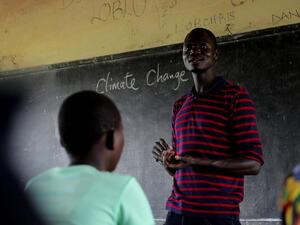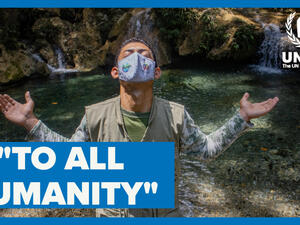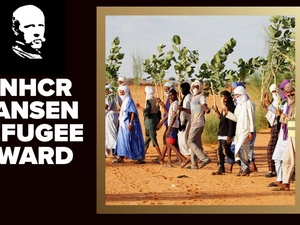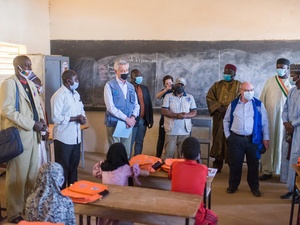Bhutanese refugees in Nepal soon to cook with bio-briquettes
Bhutanese refugees in Nepal soon to cook with bio-briquettes
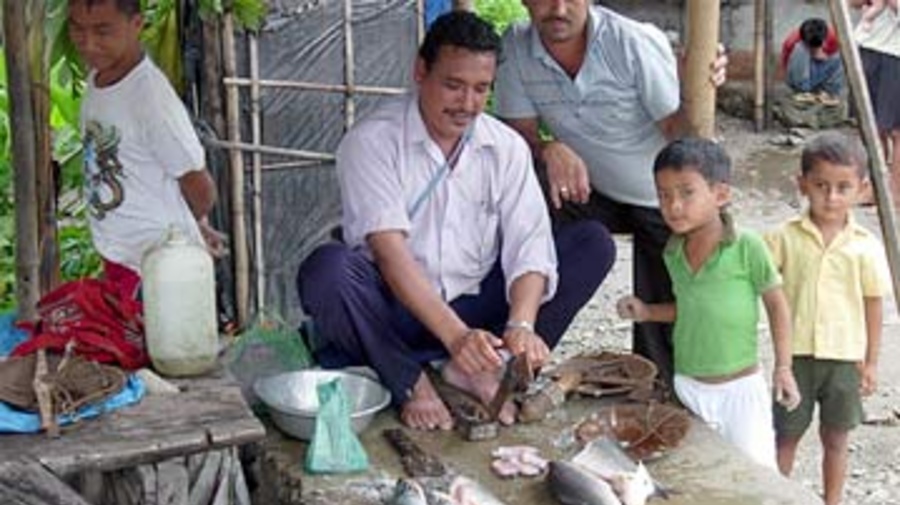
Future catches in the refugee camps of Nepal will be cooked over bio-briquettes – a much cheaper and more environmentally-friendly fuel than the kerosene used until now.
DAMAK, Nepal, December 14 (UNHCR) - Bhutanese refugees in seven camps in eastern Nepal will start cooking with environmentally friendly bio-briquettes in 2006, as the UN refugee agency cannot afford the increased cost of the kerosene that is currently used for fuel.
The UN refugee agency launched a two-week information campaign in the camps last week to inform the refugees about the decision to replace the kerosene currently used for cooking with the bio-briquettes in all the camps starting from 1 January 2006. Training will also be provided to the refugees on how to use the briquettes correctly.
UNHCR has been providing the refugees with kerosene as cooking fuel since 1992, and some refugees have expressed their unhappiness about the change to bio-briquettes. However, there are pressing economic reasons for the change.
"Rising world oil prices are having a devastating effect on the UN refugee agency's budget," said Abraham Abraham, UNHCR's representative in Nepal.
"The increase in oil prices has stretched UNHCR's already very limited resources and has made it difficult for the agency to maintain the kerosene distribution in sufficient quantity, let alone meet other priority needs," he added.
Kerosene accounted for over 30 percent of the total programme budget for Bhutanese refugees in 2003. This rose sharply to 41 percent in 2004, and then again to 50 percent in 2005.
"Given budgetary and funding constraints, and also to prevent environmental degradation around the camps due to the pressure of the refugee population on the forest, the agency has opted for viable fuel alternatives," Abraham said.
During the first quarter of 2006, compressed coal dust briquettes will be distributed to the refugees. Then, in the second quarter, pressurized honey-comb briquettes which contain biomass collected from nearby forests with clay as binding material will be introduced. Both types of briquette have advantages in terms of health and environmental friendliness over the usual commercially available briquettes.
But convincing refugees of the necessity for change has not been easy. The bio-briquette information campaign included interactive sessions with the refugees - particularly with the women, who do most of the cooking. The bamboo and thatch meeting halls in all of the camps were crowded with refugees.
Soon after the interactive sessions started, questions related to the use and availability of the bio-briquettes started pouring in - along with some heated reactions.
"We have never used bio-briquettes. It is a new thing for us. Continue giving us kerosene," said one refugee. Nodding their heads, most of the others seemed to agree.
"Kerosene is so convenient. We are sure there will be a lot of problems with the change," said another angry-looking refugee, after reading the UNHCR information pamphlet.
The kerosene issue touches refugee's lives in more ways than simply being an important form of fuel, and this partly explains the initial reluctance to accept the bio-briquettes.
Kerosene is not the main energy source used to meet the refugees' daily needs. They also use firewood and sawdust which are readily available from local vendors in the nearby villages. The refugees also exchange kerosene for currency to buy other commodities, and some of the kerosene is sent to refugee students studying in the nearby towns.
Refugees also use kerosene for lighting, but this will not be affected by the change to bio-briquettes.
"To meet the continued lighting needs of refugee families in 2006, one litre of kerosene will still be provided per family per month," Abraham said. Up until now, a family of three received four litres per month, and a family of five received eight.
Within the crowds, there were some who seemed to have accepted and understood the reasons for the change. Sitting on a jute mat in the middle of one meeting hall, an elderly refugee said, "We need something to cook our food. So whether it is kerosene or bio-briquettes, it does not matter much."
"What we want most is to be able to return home. We are tired of living as a refugee," he added.
The Bhutanese refugees, of Nepali ethnic origin, sought refuge in Nepal 15 years ago after being evicted from Bhutan. However, after years of bilateral negotiations between Nepal and Bhutan on repatriation, the prospects for return appear limited. While excluded from the bilateral negotiations, UNHCR has continued to advocate for a long-term solution to the plight of the refugees.
By Nini Gurung in Damak, Nepal




